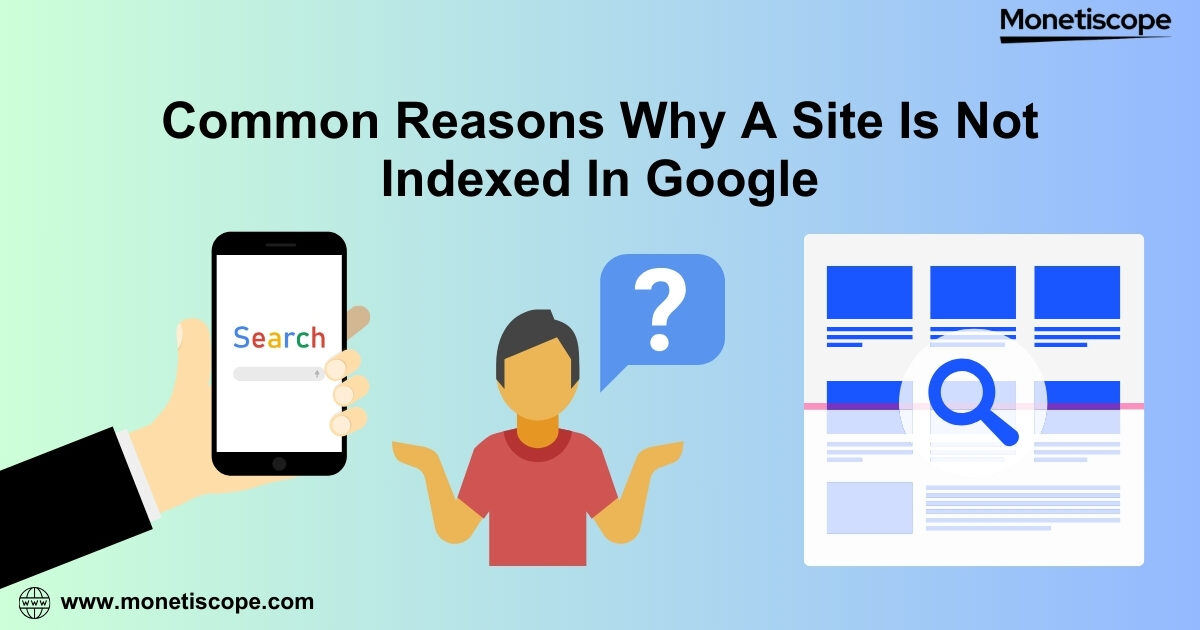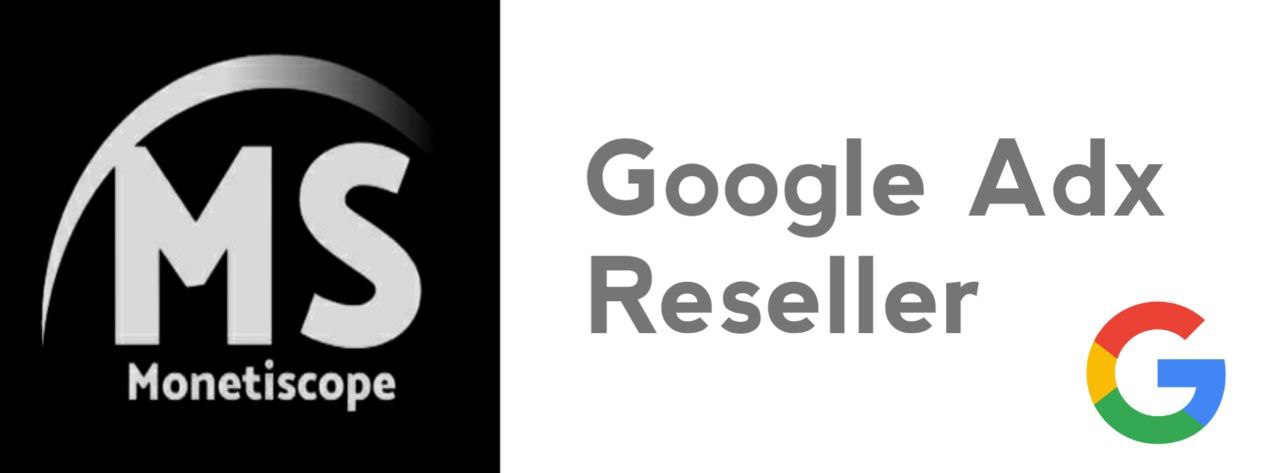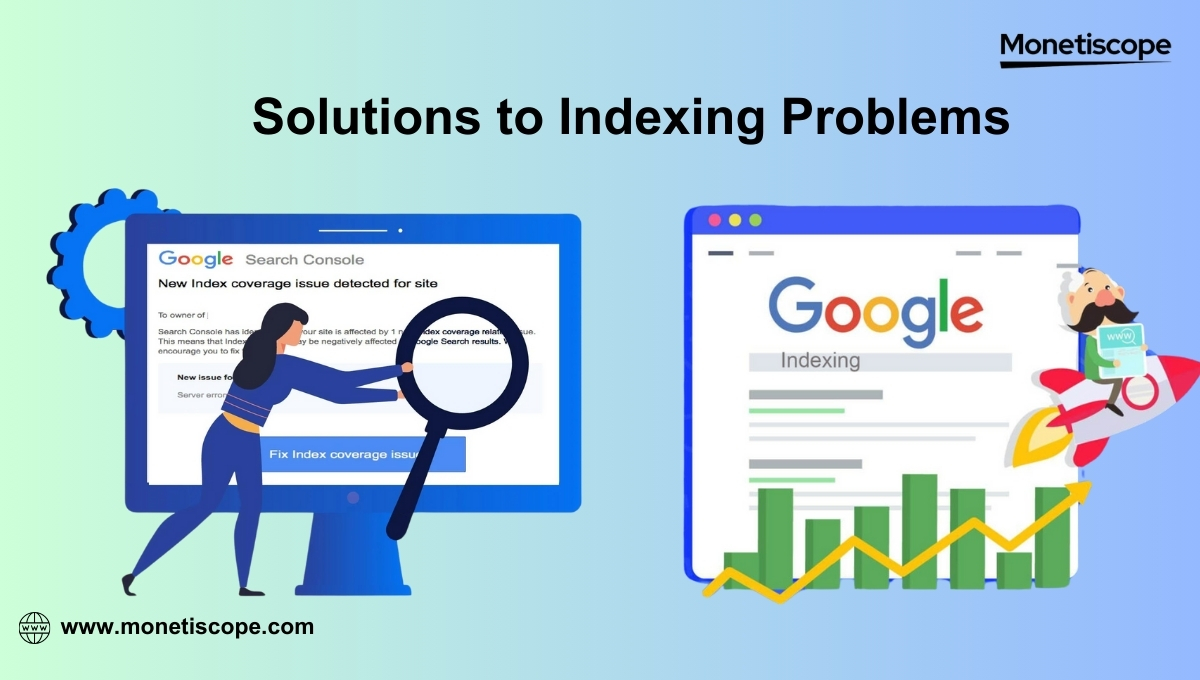Having your website indexed by Google is crucial for its visibility and traffic. However, there are times when Google doesn’t index your site, leading to a significant drop in traffic and engagement. In this article by Monetiscope, we’ll explore the common reasons Why is my site not indexing in google, how to address these issues, and the impact of copied and low-value content on indexing.
Common Reasons Why My Site Is not indexing in Google

1. Noindex Tag
One of the most common reasons Google isn’t indexing your site is the presence of a `noindex` tag in your site’s HTML code. This tag tells search engines not to index the page.
2. Robots.txt File Blocking
Your site’s `robots.txt` file might be blocking Googlebot from crawling your pages. This file is used to manage which parts of your site are accessible to search engines.
3. Poor Site Structure
A poor site structure can make it difficult for Googlebot to crawl and index your site. This includes having broken links, deep pages, and poor internal linking.
4. Slow Loading Speed
Google favors sites that load quickly. Slow loading times can result in fewer pages being crawled and indexed.
5. Lack of Backlinks
Backlinks are crucial for Google to discover your site. A lack of backlinks can result in your site not being indexed.
6. Duplicate Content
Having duplicate content on your site can confuse Googlebot, leading to indexing issues. Google may not know which version of the content to index.
7. Copied or Low-Value Content
Copied content from other sites or content that provides little value to users can prevent your site from being indexed. Google aims to provide users with original and valuable content.
Solutions to Indexing Problems
1. Remove Noindex Tags
Ensure that your pages do not have a `noindex` tag if you want them to be indexed. Check your site’s HTML code and remove this tag where necessary.
2. Update Robots.txt File
Review your `robots.txt` file to ensure it isn’t blocking Googlebot from crawling your pages. Allow access to important parts of your site.
3. Improve Site Structure
Create a clear and logical site structure. Use internal linking to help Googlebot navigate your site efficiently. Fix broken links and avoid having important pages buried deep within your site.
4. Optimize Loading Speed
Improve your site’s loading speed by optimizing images, leveraging browser caching, and using a content delivery network (CDN). Tools like Google PageSpeed Insights can help identify areas for improvement.
5. Build Quality Backlinks
Focus on building high-quality backlinks to your site. Engage in guest blogging, create valuable content that others want to link to, and participate in relevant online communities.
6. Address Duplicate Content
Use canonical tags to indicate the preferred version of duplicate content. Consolidate similar content and ensure each page has unique and valuable information.
7. Create Original, High-Value Content
Focus on creating content that is original, informative, and valuable to your audience. Avoid copying content from other sites. Instead, offer unique perspectives, thorough research, and comprehensive insights.
Impact of Copied and Low-Value Content
Copied Content:
Copied content not only confuses Googlebot but also diminishes your site’s credibility. Google prioritizes original content in search results, so having copied content can significantly harm your site’s indexing and ranking.
Low-Value Content:
Low-value content, which provides little to no benefit to users, can lead to indexing issues. Google aims to deliver high-quality results to its users, so sites with low-value content are less likely to be indexed and ranked well.
Detailed Solutions to Improve Indexing
Regular Content Audits:
Perform regular content audits to identify and remove low-value or duplicate content. Ensure that each page provides unique value and aligns with your audience’s interests.
Use Google Search Console:
Google Search Console is a valuable tool for monitoring and addressing indexing issues. It provides insights into how Google views your site and identifies specific problems that need attention.
Submit a Sitemap:
Submitting a sitemap to Google helps ensure all your important pages are discovered and indexed. A sitemap provides a roadmap of your site, making it easier for Googlebot to crawl.
Mobile-Friendly Design:
Ensure your site is mobile-friendly. With mobile-first indexing, Google primarily uses the mobile version of your site for indexing and ranking. Use responsive design and test your site on various devices.
Secure Your Site with HTTPS:
Sites secured with HTTPS are given preference in Google’s indexing. Ensure your site uses HTTPS to provide a secure browsing experience for users.
Conclusion
Ensuring your site is indexed by Google is crucial for its visibility and success. By understanding and addressing the common issues that prevent indexing, you can improve your site’s chances of being discovered and ranked by Google. Focus on creating original, high-value content, optimizing your site structure, and leveraging tools like Google Search Console to monitor and enhance your indexing status.
By following these steps and regularly updating your site, you can improve its indexing and ultimately achieve better search visibility and higher traffic. Remember, prioritizing quality over quantity and providing value to your audience are key factors in successful indexing and ranking.
FAQs
Why isn’t Google indexing my new site?
Google may take time to discover and index new sites. Ensure you’ve submitted your site to Google Search Console and have quality backlinks pointing to your site.
How can I check if my site is indexed by Google?
Use the site:yourdomain.com search operator in Google to see which pages are indexed. Google Search Console also provides indexing status.
What should I do if my site is blocked by robots.txt?
Update your `robots.txt` file to allow Googlebot access to important parts of your site. Ensure that key pages are not being blocked.
How often should I update my site to improve indexing?
Regular updates with fresh, high-quality content can improve indexing. Aim to update your site frequently with relevant information.
Can social media help with indexing?
While social media links are typically nofollow, they can still drive traffic and indirectly help with indexing by increasing visibility and engagement.
How does site speed affect indexing?
Slow loading times can reduce the number of pages Googlebot crawls. Optimize your site for speed to improve indexing and user experience.
Why is my copied content not indexed?
Google prioritizes original content. Copied content can lead to indexing issues and harm your site’s ranking. Focus on creating unique content.
What role do backlinks play in indexing?
Backlinks help Google discover your site. Quality backlinks from reputable sites can improve indexing and search visibility.


